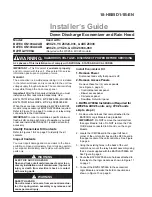
(Mar, 2012)
Compact CWE Series Installation, Operation & Maintenance Manual
Air Technology Systems, Inc.
2-8
2.6.7 Remote Water Detector
The remote water detector is normally placed on the
sub-fl oor or in a fi eld supplied auxiliary drain pan
located beneath the unit. SATS provides 2 types of
water detectors:
Spot type water detector-
Remove the protective cover and connect two control
wires to the terminals on the
base. Run the control wires into
the electric box and connect
them to the control terminal
block as shown in the wiring
diagram provided with your unit.
Replace the cover and place the
water detector(s) on the fl oor
with the metal electrodes facing down. When water is
present, current will fl ow between the electrodes. The
base is provided with a mounting hole in the center
which may be used to secure the water detector in
place.
NOTE
Do not place the spot type water detector on
an electrically conductive surface.
Cable type water detector-
Lay the cable water
detector fl at across the
sub-fl oor where water
could collect (see Figure
7). Secure the cable every
12-18 inches with J-clips or cable ties with adhesive
mounting pads when installing it in the airstream.
Secure it at each turn of the cable and when routing
it around obstructions. Do not tie the water detector
cable to the metal fl oor stand or to pipes.
When a water leak on the fl oor reaches the cable,
current will fl ow between the cable wires. A two
conductor wire harness is provided with a quick
connect fi tting on the end. The harness mates to
the fi tting on the water detector and connects it to
the control terminal block inside the electric box as
shown in the wiring diagram provided with your unit
(see Figure 18).
Supply Air Control- As an option, a fi eld installed
T/H sensor may be used for supply air control. The
sensor is fi eld installed in the supply air stream. The
supply air temperature and humidity are monitored
by the system controller and compared to limit values
set at the factory. Control outputs are based on set
points entered into the system controller by the user.
Room Air Control with Supply Air Limitation- The
controller monitors the T/H sensor located in the
return air stream and a T/H sensor located in the
supply air stream. Control is similar to “Room
Air Control” except, the temperature setpoint is
automatically increased by the controller when the
measured supply air temperature exceeds the Start
Temperature entered by the user. The extent of the
setpoint increase is determined by a factor which
the user enters in the controller as a gradient. A high
gradient signifi cantly corrects the failure to meet
the supply air temperature but has the risk that the
control circuit starts to hunt.
With humidity control, the setpoint shift acts in the
opposite direction. If the starting humidity entered
by the user is exceeded by the measured supply air
humidity, the setpoint is automatically reduced by the
controller. The user may also enter a gradient factor
for humidity control.
Formula:
New setpoint = old s [gradient • (start value
-actual value)]
Example (temperature): 70.5 = 70 + [0.5 • (61 - 60)]
Example (humidity): 49 = 50 + [0.5 • (70 - 72)]
Supply Air Control with Room Air Limitation- Based
on the same principle as “Room Air Control with
Supply Air Limitation” however, in this case the
setpoint shift works in the opposite direction on the
basis that the supply air is colder than the return air.
The temperature setpoint is automatically reduced by
the system controller when the measured room air
temperature exceeds the Start Temperature entered
by the user. The humidity setpoint is automatically
increased by the system controller when the
measured room humidity drops below the starting
humidity entered by the user.
















































